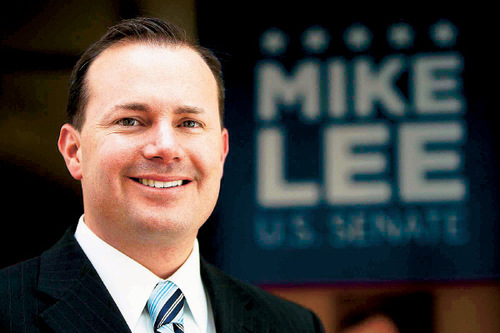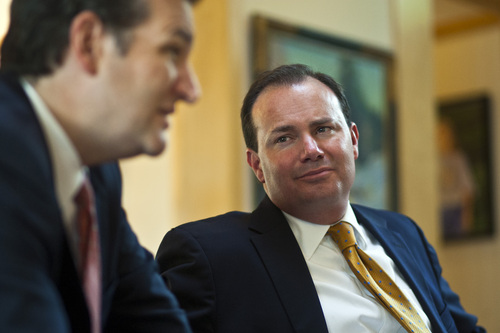This is an archived article that was published on sltrib.com in 2014, and information in the article may be outdated. It is provided only for personal research purposes and may not be reprinted.
Washington • Sen. Mike Lee says he's gung-ho about running for re-election in 2016 and is confident he'll win — no matter what system Utah has in place for selecting candidates.
Lee, a tea-party darling who supporters of the Count My Vote effort had said helped prompt efforts to change the state's primary system, said just off the Senate floor that while the nominating system will be different, it won't change his focus.
"I'll play in any system we adopt as a state," Lee said, "and I intend to run, and I intend to win."
Gov. Gary Herbert signed the bill into law and Tuesday praised it as a sound compromise. It won't take effect until the 2016 election.
Lee, who exited the Senate chamber Tuesday with Texas Sen. Ted Cruz, didn't want to criticize the changes, opting only to say he is moving forward no matter the path to the nomination.
Count My Vote, which had raised $1 million and gathered 100,000 signatures, agreed to suspend its efforts once Herbert signed into law an alternative route onto the primary ballot for candidates who didn't want to go through, or didn't make it, in the caucus-convention system.
Lee, along with then-Senate candidate Tim Bridgewater, ousted Sen. Bob Bennett in the 2010 Republican convention, knocking out the 18-year veteran who then had no option to get on the primary ballot. Had the new rules been in place, Bennett could have had another shot at the nomination.
Bennett said Tuesday that the new process is a game changer for Utah politics in that future candidates may avoid the convention, and in doing so, voters will have much different choices on their ballots.
"The cost-benefit analysis says that you shouldn't bother to go to the convention ever again if you're running for a statewide race because [signature gathering is] so much cheaper," Bennett says, noting that contenders often spend tens of thousands of dollars winning over delegates instead of saving that money for a primary battle.
The former senator added that had he known in 2010 the convention he would face he would have felt a serious temptation to go straight
to gathering signatures to get on the primary ballot had that been an option at the time. Polls then showed he likely would have won.
"I think it will seriously change [Utah] politics," he said.
Lee's Senate colleague, Orrin Hatch, who spent nearly $4 million securing the GOP nod in 2012 amidst challenges from the right, says he tried to stay out of the fight over the Count My Vote process though he did donate $50,000 toward the effort from his political action committee. He said the end result is an "interesting compromise."
"It does look to me like it's a successful compromise that brought people from both sides together," Hatch said Tuesday. "To me that's a good thing."
The governor said Tuesday that he remains an "adamant" supporter of the caucus-convention system and a product of it. But the system only works if
everyone participates and the shrillest voices on both sides don't control the process.
Herbert said he does have concerns about the state telling parties how to conduct their business. It will need modifications in the future, he added, but "on balance I think it was the best thing to do for the people of Utah."
Gathering 28,000 signatures to run for statewide office is a high bar, but can be achieved, Herbert said.
"If I'm running again for governor, I think the convention system would be easier for me than going out and getting 28,000 signatures," he said. "This will not be a death warrant for the caucus-convention system in my view. In fact, some would argue it has preserved it."
Freshman Rep. Chris Stewart, R-Utah, who captured the 2012 nomination in a controversial and accusation-filled 2nd Congressional District convention fight, said he sees the new process driving more money into campaigns, and helping candidates who are wealthier or better fundraisers. But he's taking a wait-and-see approach.
"I've always said there are some advantages to both [the caucus-convention and Count My Vote approaches], and I really believe that," Stewart said Tuesday. "Neither process is perfect. Both of them could have been improved."
Robert Gehrke contributed to this report.





